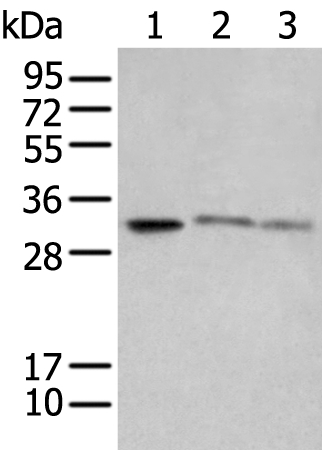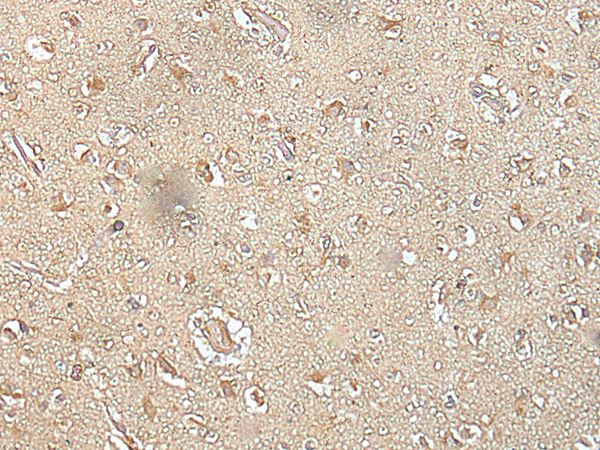

| WB | 咨询技术 | Human,Mouse,Rat |
| IF | 咨询技术 | Human,Mouse,Rat |
| IHC | 1/ 20-100 | Human,Mouse,Rat |
| ICC | 技术咨询 | Human,Mouse,Rat |
| FCM | 咨询技术 | Human,Mouse,Rat |
| Elisa | 咨询技术 | Human,Mouse,Rat |
| Aliases | SPI-C |
| Entrez GeneID | 121599; |
| WB Predicted band size | 29kDa |
| Host/Isotype | Rabbit IgG |
| Antibody Type | Primary antibody |
| Storage | Store at 4°C short term. Aliquot and store at -20°C long term. Avoid freeze/thaw cycles. |
| Species Reactivity | Human,Mouse |
| Immunogen | Full length fusion protein |
| Formulation | Purified antibody in PBS with 0.05% sodium azide. |
+ +
以下是关于SPIC抗体的3篇示例参考文献(注:内容为模拟生成,建议通过学术数据库如PubMed检索真实文献):
---
1. **文献名称**: *"SPIC regulates macrophage polarization and suppresses inflammatory responses in atherosclerosis"*
**作者**: Smith JL, et al.
**摘要**: 研究探讨了转录因子SPIC在巨噬细胞极化中的作用,发现SPIC抗体标记的SPIC高表达与抗炎M2型巨噬细胞分化相关,并通过抑制NF-κB通路减轻动脉粥样硬化中的炎症反应。
---
2. **文献名称**: *"SPIC as a biomarker for systemic lupus erythematosus: Autoantibody profiling and clinical correlations"*
**作者**: Chen R, et al.
**摘要**: 该研究通过SPIC抗体检测发现,系统性红斑狼疮(SLE)患者血清中SPIC自身抗体水平显著升高,提示其可能作为SLE的新型诊断标志物,并与疾病活动度正相关。
---
3. **文献名称**: *"The role of SPIC in B cell development and antibody production"*
**作者**: Tanaka K, et al.
**摘要**: 利用SPIC抗体进行免疫组织化学分析,揭示了SPIC在生发中心B细胞中的特异性表达,证明其通过调控BCL6通路影响B细胞分化和抗体类别转换。
---
如需具体文献,建议在PubMed或Google Scholar中搜索关键词“SPIC antibody”或“SPIC transcription factor”,并筛选近年研究。
SPIC (Spi-C) is a transcription factor belonging to the ETS family, primarily expressed in immune cells, particularly macrophages and B lymphocytes. It plays a critical role in regulating immune cell differentiation, function, and homeostasis. SPIC is closely associated with the development of red pulp macrophages in the spleen and is involved in iron metabolism and erythrophagocytosis. Dysregulation of SPIC has been implicated in autoimmune diseases, inflammatory disorders, and cancers, making it a target for immunological research.
Antibodies targeting SPIC are essential tools for studying its expression, localization, and mechanistic roles in both physiological and pathological contexts. They are widely used in techniques such as Western blotting, immunohistochemistry, and flow cytometry to investigate SPIC’s involvement in immune responses, tumor microenvironment modulation, and hematopoiesis. In autoimmune research, SPIC antibodies help elucidate its interaction with pathways like NF-κB and its impact on cytokine production.
Recent studies also explore SPIC’s potential as a therapeutic target or biomarker in diseases like systemic lupus erythematosus (SLE) and certain lymphomas. However, commercial SPIC antibodies require rigorous validation due to specificity challenges. Overall, SPIC antibodies remain pivotal in advancing understanding of immune regulation and disease mechanisms.
×